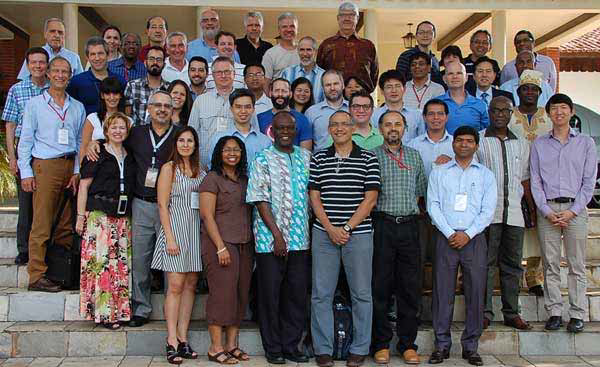Exploring the implications of Prosperity Theology in the current decade
Dr Rosalee Velloso Ewell, Executive Director of the WEA Theological Commission, was one of the key speakers at a consultation on prosperity theology, poverty and the gospel. Her address was titled, ‘Can We Offer a Better Theology?’ and can be seen on-line at http://conversation.lausanne.org/en/resources/detail/13571.
Dr Ewell was one of about 40 specialists drawn from all continents— leading thinkers, pastors and practitioners who met near São Paulo, Brazil, from 30 March – 2 April for the conference. The gathering was hosted by Valdir Steuernagel, a member of the WEA International Council and of the Lausanne Board of Directors. The consultation built on work already undertaken by the Lausanne Theology Working Group on the Prosperity Gospel in Akropong, Ghana, from 2008-2009.
It is clear that there is no one single ‘prosperity theology’. Prosperity theologies may be seen in different forms. The present major concerns are the forms which undermine the truth of the gospel, parody the grace of God, and attribute a power to the preacher, which is a travesty of the power of the Holy Spirit at work through the accurate preaching of the Scriptures.
The false theology has found widespread appeal in the West. Femi Adeleye, based in Ghana, and Director of Church Partnerships for World Vision International, particularly noted the influence in this area of American televangelists. It was also recognized, as is made clear in The Cape Town Commitment llE, that God does indeed bless in material ways, and that there can be a true, biblical relationship between his blessing and human prospering.
Contributions in Atibaia examined historical, sociological, cultural, economic, and theological contexts in which prosperity teachings occur. Presentations brought well-researched and perceptive insights. They examined the nature of such contexts and the difficulties created, not least for the biblically illiterate who are unable to calibrate the teaching they hear.
While such excesses are more graphic in some places than others, these excesses bring insidious expressions of an inadequate doctrine of creation, of sin, and of grace which pervades the church in many nations. Each speaker demonstrated a deep knowledge of at least one continent, and plenary discussion drew further insights.
The following presentations were delivered:
A foundational paper (Valdir Steuernagel, Maicon Steuernagel)
‘What is Prosperity Theology: A sociological review’ (Paul Freston)
‘The New Apostolic Reformation and Prosperity Theology’ (Martin Ocaña)
‘Giving for a Return in the Prosperity Gospel and the New Testament’ (David Downs)
‘Protestant Work Ethics and Prosperity Theology’ (Paul Miller)
‘A Critique of the Way the Bible is Used’ (Femi Adeleye)
‘The Search for Balance: Prosperity and Poverty in the Bible’ (Kwabena Asamoah-Gyadu)
‘How is Prosperity Theology Penetrating the Theology and Practice of Mainline Churches?’ (Daniel Salinas)






Stay Connected